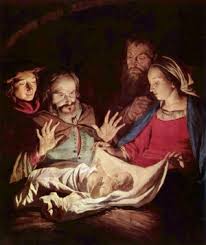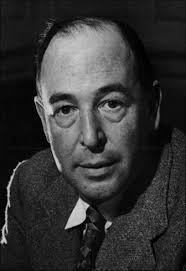Glory to God in the highest and on earth peace, good will toward men.And it came to pass, as the angels were gone away from them into heaven, the shepherds said one to another,
Let us now go even unto Bethlehem, and see this thing which is come to pas, which the Lord hath made known unto us.
 And they came with haste, and found Mary, and Joseph and the babe lying in a manger. And when they had seen it, they made known abroad the saying which was told them concerning this child. And all they that heard it wondered at those things which were told them by the shepherds. But Mary kept all these things, and pondered them in her heart. And the shepherds returned, glorifying and praising God for all the things that they had heard and seen, as it was told unto them. (The Gospel According to Luke, Chapter Two, Verses 13-20)
And they came with haste, and found Mary, and Joseph and the babe lying in a manger. And when they had seen it, they made known abroad the saying which was told them concerning this child. And all they that heard it wondered at those things which were told them by the shepherds. But Mary kept all these things, and pondered them in her heart. And the shepherds returned, glorifying and praising God for all the things that they had heard and seen, as it was told unto them. (The Gospel According to Luke, Chapter Two, Verses 13-20)Here we are again, on the first day of the Christmas season. It has become something of a Christmas tradition for me to engage the following text by C.S. Lewis in connection with the above quoted Scriptures. The reason will be obvious.
Nearly every Christmas, it seems, NEWSWEEK or TIME or some television special will feature the "latest scholarship" questioning the "authenticity" of the Christmas story. I am not concerned with the question about whether the Nativity of our Lord occurred on December 25th. That's a matter of Church tradition and incidental to my concerns here. What concerns me is how the Biblical narrative itself is invariably called into question or even dismissed as mere "myth" -- the account of the shepherds, the Angelic host, the Christ Child in a manger, the Star and the Magi from the East, Herod's slaughter of the innocents, the flight of Mary and Joseph and the Christ Child into Egypt, etc.
The scholarly authorities typically interviewed, whether Catholic or Protestant, are consistently and incorrigibly one-sided, quite thoroughly corrupted by the Humean and Kantian philosophical presuppositions undergirding the historical-critical reading of the Biblical narrative. Typical is the About.com website, where Internet browsers frequent to learn "the facts" about this or that -- a site where one finds this sort of thinking gone to seed in an article by Austin Cline, "Nativity vs Gospels: Are the Gospels Reliable About Jesus' Birth?" (About.com), where the partisan skepticism of such historical critical assumptions is abundantly evident in his suggestions that all the key ingredients of the Nativity story in the Gospels were concocted fictions of various kinds.
The lack of critical circumspection, if not patent fantasy, in all of this would be amusing if it were not so destructive. The upshot is always the same: that the Gospel writers are unreliable and not to be trusted, and certainly not to be taken at face value. Just how ludicrous this all is, however, can be seen easily by anyone with a modicum of familiarity with literature, mythology, and history.
 One of the best examples of a powerful antedote to this kind of foolishness -- and one I keep using because it is simple -- is a little essay by C.S. Lewis entitled "Modern Theology and Biblical Criticism," which is available in a collection of essays by Lewis entitled Christian Reflections
One of the best examples of a powerful antedote to this kind of foolishness -- and one I keep using because it is simple -- is a little essay by C.S. Lewis entitled "Modern Theology and Biblical Criticism," which is available in a collection of essays by Lewis entitled Christian Reflections1. [If a scholar] tells me that something in a Gospel is legend or romance, I want to know how many legends and romances he has read, how well his palate is trained in detecting them by the flavour...Lewis, of course, was hardly a naive ignoramus. He knew all the critical objections to Christianity because for the first part of his life he was himself a confirmed agnostic. He was anything but "soft-minded," to use the Jamesian idiom. He taught philosophy at Oxford briefly before going on to teach Medieval and Renaissance literature at Magdalen College, Oxford, and conclude his prolific academic career teaching at Cambridge. An account of his conversion can be found in his Surprised by Joy: The Shape of My Early Life,
I have been reading poems, romances, vision-literature, legends, myths all my life. I know what they are like. I know that not one [of the stories in the Gospel of John, for example] is like this... Either this is reportage - though it may no doubt contain errors - pretty close up to the facts; nearly as close as Boswell. Or else, some unknown writer in the second century, without known predecessors or successors, suddenly anticipated the whole technique of modern, novelistic, realistic narrative...
2. All theology of the liberal type involves at some point - and often involves throughout - the claim that the real behaviour and purpose and teaching of Christ came very rapidly to be misunderstood and misrepresented by his followers, and has been recovered or exhumed only by modern scholars... The idea that any... writer should be opaque to those who lived in the same culture, spoke the same language, shared the same habitual imagery and unconscious assumptions, and yet be transparent to those who have none of these advantages, is in my opinion preposterous. There is an a priori improbability in it which almost no argument and no evidence could counterbalance.
3. Thirdly, I find in these theologians a constant use of the principle that the miraculous does not occur... This is a purely philosophical question. Scholars, as scholars, speak on it with no more authority than anyone else. The canon 'if miraculous, unhistorical' is one they bring to their study of the texts, not one they have learned from it. If one is speaking of authority, the united authority of all the Biblical critics in the world counts here for nothing.
4. My fourth bleat is my loudest and longest. Reviewers [of my own books, and of books by friends whose real history I knew] both friendly and hostile... will tell you what public events had directed the author's mind to this or that, what other authors influenced him, what his over-all intention was, what sort of audience he principally addressed, why - and when - he did everything... My impression is that in the whole of my experience not one of these guesses has on any one point been right; the method shows a record of 100 per cent failure.
The 'assured results of modern scholarship', as to the way in which an old book was written, are 'assured', we may conclude, only because those who knew the facts are dead and can't blow the gaff... The Biblical critics, whatever reconstructions they devise, can never be crudely proved wrong. St. Mark is dead. When they meet St. Peter there will be more pressing matters to discuss.
However... we are not fundamentalists... Of course we agree that passages almost verbally identical cannot be independent. It is as we glide away from this into reconstructions of a subtler and more ambitious kind that our faith in the method wavers... The sort of statement that arouses our deepest scepticism is the statement that something in a Gospel cannot be historical because it shows a theology or an ecclesiology too developed for so early a date...
Such are the reactions of one bleating layman... Once the layman was anxious to hide the fact that he believed so much less than the Vicar; he now tends to hide the fact that he believes so much more...
You must picture me alone in that room in Magdalen, night after night, feeling, whenever my mind lifted even for a second from my work, the steady, unrelenting approach of Him whom I so earnestly desired not to meet. That which I greatly feared had at last come upon me. In the Trinity Term of 1929 I gave in, and admitted that God was God, and knelt and prayed: perhaps, that night, the most dejected and reluctant convert in all England. I did not then see what is now the most shining and obvious thing; the Divine humility which will accept a convert even on such terms. The Prodigal Son at least walked home on his own feet. But who can duly adore that Love which will open the high gates to a prodigal who is brought in kicking, struggling, resentful, and darting his eyes in every direction for a chance of escape? The words “compelle intrare,” compel them to come in, have been so abused be wicked men that we shudder at them; but, properly understood, they plumb the depth of the Divine mercy. The hardness of God is kinder than the softness of men, and His compulsion is our liberation. (emphasis added)Lewis, an Anglican, was a man of deep Catholic habit of mind, probably because of his immersion in medieval literature; and many have wondered why he never himself crossed the Tiber. Walker Percy even compared him to Moses, who led many others to the Promised Land, though never himself crossing over. A number of books have been written about this, like Joseph Pearce's C.S. Lewis and the Catholic Church,
For further reading:
- Jesus Seminar critically examined (edited by Pertinacious Papist)
- C.S. Lewis, Christian Reflections,
edited by Walter Hooper.
- If you're interested in reading the relevant chapter from Lewis's book online, click on: "Modern Theology and Biblical Criticism" (Lewis on Biblical Criticism, posted June 10, 2005)
- Hurd Baruch, "The Crisis in Biblical Scholarship" (New Oxford Review, December 2014).
- Mark Giszczak, "The Early Responsa of the Pontifical Biblical Commission" (Catholic bible Student, March 20, 2008)

No comments:
Post a Comment